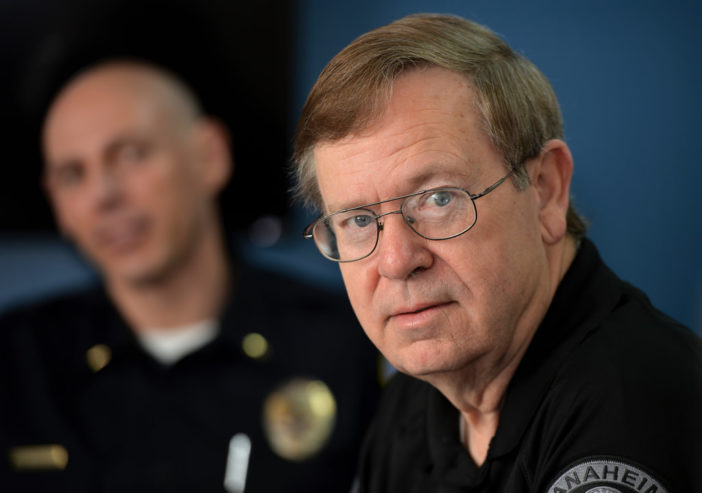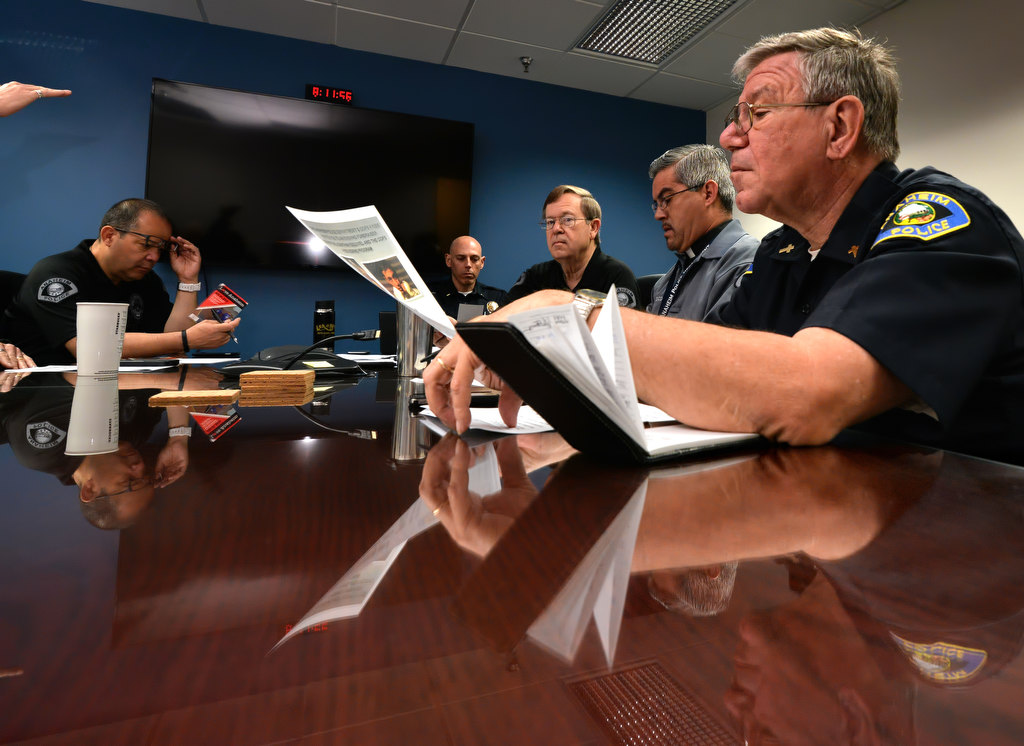A domestic dispute ends in a shooting, leaving one person injured and one dead.
A young mother dies, leaving three children in the home stunned.
A teenager dies in his sleep, leaving a family in chaos.
What all of these incidents have in common is that not only were police called out for assistance, but shortly after, so were Anaheim Police Department chaplains.
“We serve at the pleasure of the police department,” says Chaplain Jimmy E. Gaston. “It’s sometimes a very simple situation of being there to provide a sense of calm and provide prayer to people. Other times they need to know what the process is going to be.”
The Anaheim Police Chaplains program was founded in December 1990 by the APD with four chaplains who serve as a spiritual support group to police, personnel, victims and others in need of prayer, a shoulder to cry on or as providers of information pertaining to police procedure following a crime or trauma.
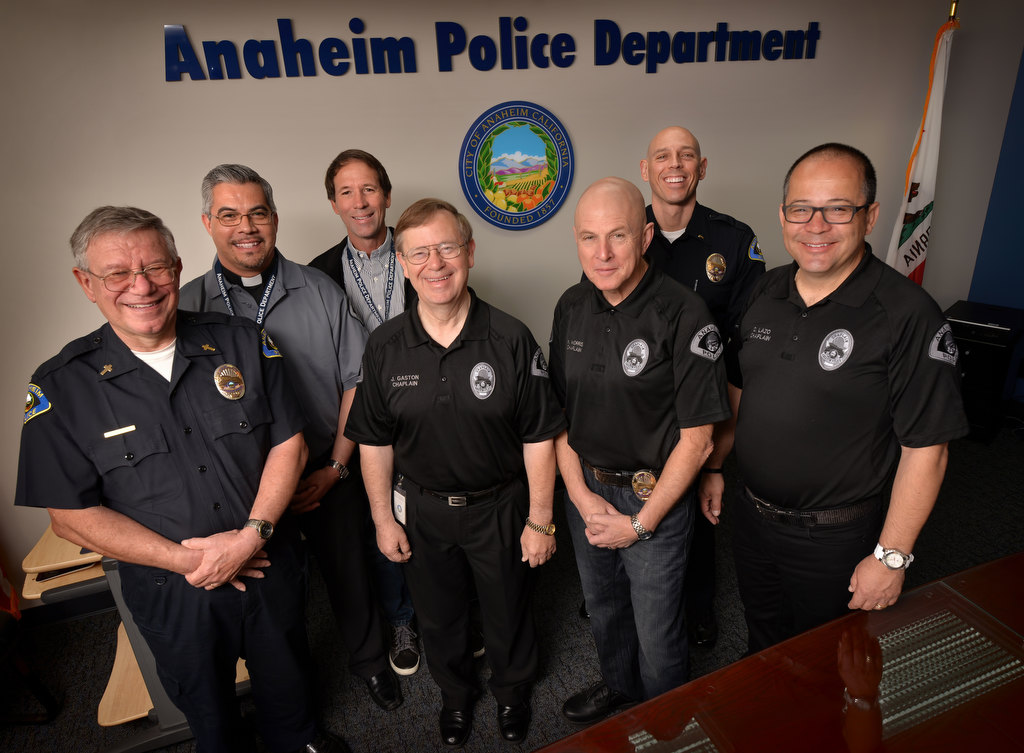
Gathering at Anaheim Police headquarters are, from left, Kerry Duerr, pastor at Prince of Peace Lutheran Church; Fr. Gilberto Escobedo, priest and pastor of St. Boniface Catholic Church; Nathan Zug, pastor of Community Concerns at Magnolia Baptist Church; Jimmy Gaston, minister at Church of Christ; Nigel Morris, pastor at Vineyard Christian Fellowship of Anaheim; Lt. Brian McElhaney, chaplain coordinator for the Anaheim PD; and Pastor David Lazo, who pastors Iglesia de Poder/Church of Power. Not present is Brian Crow and Fr. Timothy Freyer.
Photo by Steven Georges/Behind the Badge OC
Since 2005, the chaplains have grown into an eight-person crew, offering the department 24/7 access via a cell phone that one of the chaplains carries and then forwards calls to the appropriate chaplain on call, depending on the circumstance. For example, if there is a need for a Spanish speaker, one of the chaplains who speaks Spanish is sent out.
“A lot of it is paying attention when you’re on scene as to what the needs are,” Gaston says.
Gaston, the current head of the program (chaplains rotate out each year as program leaders), has been serving the Anaheim Police Chaplains for 20 years in May. Before that, he served as a police chaplain for eight years in Pasadena, Texas.
All of the Anaheim Police Chaplains except for one (Bryan Crow) serves a church full time. Crow, who still is very active in the community, was one of the original four chaplains who helped build the program into what it is today.
There are two Catholic priests and various denominations of Christian pastors that make up the program, but if another religious representative is requested, the chaplains have access to others that can lend a hand.
When a death, crime, traffic accident or other trauma occurs, not only may emotional support be necessary, but also access to information about funeral homes and other related contacts.
This is where the chaplains come in.
And the help isn’t only for victims of crimes. Sometimes police officers need their help, too.
Gaston recalls years ago when there was a rash of child drownings in pools. He responded to a hospital following one such drowning. He knew one of the officers had two kids at home around the same age as the victim. Gaston offered up some support to her.
“It [was]a matter of paying attention to her needs,” he says. “We had to talk through some stuff.”
Another time at a scene, there was an officer who had responded to a suicide threat but couldn’t stop the victim in time. He shot himself. The officer took it hard. It was another situation when the chaplains offered support.
“Sometimes it’s a matter of being aware that you’ve got officers in that scene that have been touched and they need a hand on the shoulder, some encouraging words,” Gaston says.
Whether it’s 2 a.m. or 2 p.m. (though usually it’s the former) – “Rarely am I called at 2 o’ clock in the afternoon,” Gaston says – there will be a chaplain or chaplains available to serve the needs of the traumatized.
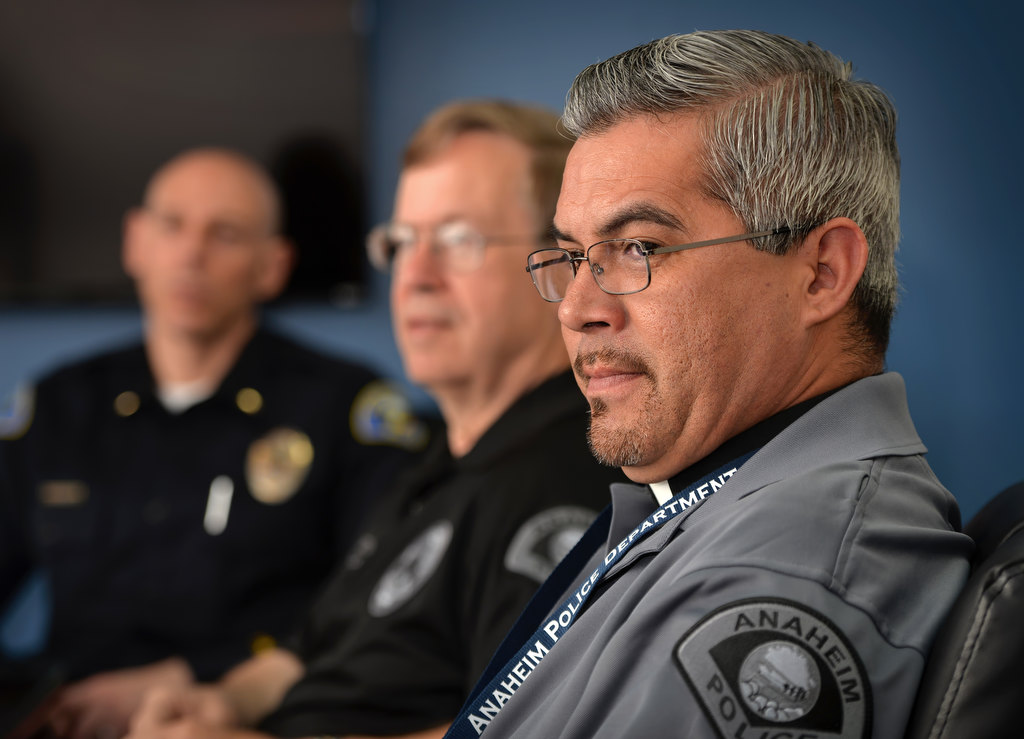
Fr. Gilberto Escobedo, priest and pastor of St. Boniface Catholic Church, right, attends a gathering at Anaheim PD headquarters to discuss issues regarding police chaplains. Behind him is Jimmy Gaston, minister at Church of Christ, and Anaheim PD Lt. Brian McElhaney.
Photo by Steven Georges/Behind the Badge OC
And their services can extend beyond the initial callout, since sometimes there is follow-up.
“The call-out doesn’t end when the call-out ends,” Gaston says, adding that he’ll offer victims the department card with the chaplain cell phone number on it.
“There’s many times when a chaplain returns on follow-up and the family needs services provided by the church. Food, clothing, toys for kids, even funeral arrangements may be arranged by the chaplain as a minister.”
As part of their required training through the International Conference of Police Chaplains and Southern California Chaplains’ Association, the chaplains also learn how to provide support at incidents including hostage situations, domestic violence, suicides, school disasters and terrorism.
“Most of us have in our go bag appropriate boots and clothing so that if there’s an oil spill or gas, or other types of toxic environment, we have some protection with us in our vehicle to deal with that,” Gaston says.
Beyond traumatic events, chaplains also may attend graduation and awards ceremonies, as well as building dedications. They also can offer counseling to families of police and other personnel as well as offer premarital counseling sessions and even some confidential counseling support to officers about home life.
“Sometimes as chaplains, in addition to as ministers, we’re at city council meetings to do invocations and just for presence,” Gaston says. “The chaplains selected for this department are typically ministers [and]pastors who are already very invested [and]active in the community.”
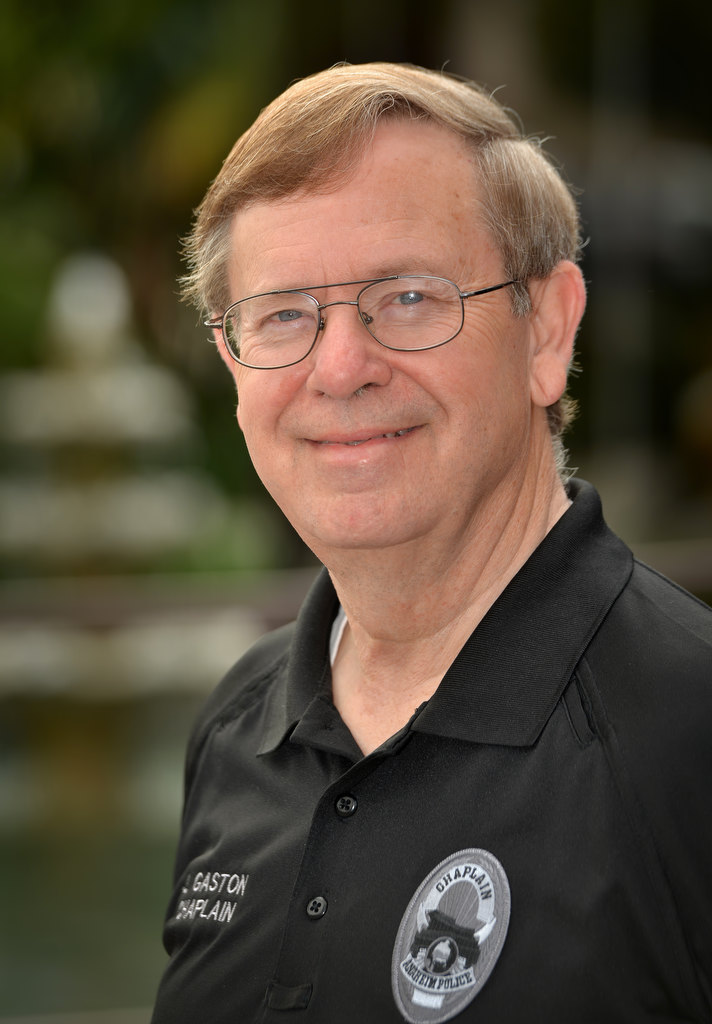
Jimmy Gaston, Anaheim PD chaplain and minister at Church of Christ.
Photo by Steven Georges/Behind the Badge OC
 Behind the Badge
Behind the Badge
